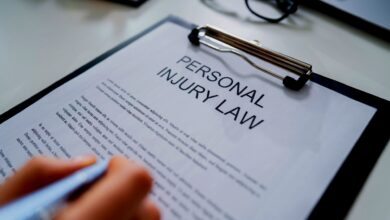Theft and Shoplifting Laws in Illinois: What Are the Penalties?
This article will provide a comprehensive overview of theft and shoplifting laws in Illinois, including the penalties and defenses.

Shoplifting is a common crime that affects retailers and consumers alike. In Illinois, shoplifting falls under the broader category of theft, and the state has specific laws and penalties in place to address this issue. Understanding the Shoplifting Laws in Illinois is crucial for both residents and visitors to avoid severe legal consequences. This article will provide a comprehensive overview of theft and shoplifting laws in Illinois, including the penalties, defenses, and long-term implications of a conviction.
What Constitutes Shoplifting Laws in Illinois?
Shoplifting, also known as retail theft, is defined under Illinois law as the act of knowingly taking possession of, carrying away, transferring, or causing the transfer of any merchandise displayed, held, stored, or offered for sale in a retail establishment with the intent to retain the merchandise or deprive the merchant permanently of the possession, use, or benefit of the merchandise without paying the full retail value.
In simpler terms, shoplifting involves taking items from a store without paying for them or altering price tags to pay less than the actual value. It’s important to note that even attempting to shoplift can lead to criminal charges under shoplifting laws in Illinois.
Types of Theft Under Illinois Law
Theft in Illinois is categorized based on the value of the stolen property and the circumstances surrounding the crime. The classifications include:
- Petty Theft: This involves stolen property valued at $500 or less. Petty theft is typically charged as a Class A misdemeanor.
- Class 4 Felony Theft: If the stolen property is valued between 500and1,000, the offense is considered a Class 4 felony.
- Class 3 Felony Theft: Theft of property valued between 1,000and5,000 is classified as a Class 3 felony.
- Class 2 Felony Theft: Stolen property valued between 5,000and10,000 falls under a Class 2 felony.
- Class 1 Felony Theft: Theft of property valued between 10,000and100,000 is considered a Class 1 felony.
- Class X Felony Theft: The most severe category, involving stolen property valued at over $100,000, is classified as a Class X felony.
These classifications determine the severity of the penalties, which can range from fines to imprisonment.
Penalties for Shoplifting laws in Illinois
The penalties for shoplifting in Illinois depend on the value of the stolen merchandise and the offender’s criminal history. Below is a breakdown of the potential consequences:
1. Petty Theft (Class A Misdemeanor)
- Fine: Up to $2,500.
- Jail Time: Up to 364 days in county jail.
- Probation: Offenders may be placed on probation instead of serving jail time.
- Restitution: The court may order the offender to pay restitution to the retailer for the value of the stolen goods.
2. Class 4 Felony Theft
- Fine: Up to $25,000.
- Prison Time: 1 to 3 years in state prison.
- Probation: Probation may be an option for first-time offenders.
- Restitution: Payment to the retailer is often required.
3. Class 3 Felony Theft
- Fine: Up to $25,000.
- Prison Time: 2 to 5 years in state prison.
- Probation: Possible, depending on the circumstances.
- Restitution: Mandatory in most cases.
4. Class 2 Felony Theft
- Fine: Up to $25,000.
- Prison Time: 3 to 7 years in state prison.
- Probation: Rarely granted for higher-value thefts.
- Restitution: Required.
5. Class 1 Felony Theft
- Fine: Up to $25,000.
- Prison Time: 4 to 15 years in state prison.
- Probation: Unlikely for this level of theft.
- Restitution: Mandatory.
6. Class X Felony Theft
- Fine: Up to $25,000.
- Prison Time: 6 to 30 years in state prison (no probation available).
- Restitution: Required.
Aggravating Factors That Increase Penalties
Certain factors can elevate the severity of shoplifting charges in Illinois, leading to harsher penalties. These include:
- Prior Convictions: Repeat offenders face stricter penalties, including longer prison sentences and higher fines.
- Theft from Specific Locations: Stealing from schools, places of worship, or government buildings can result in enhanced charges.
- Use of Force or Weapons: If the offender uses force or a weapon during the theft, the charges may escalate to robbery, which carries more severe penalties.
- Organized Retail Theft: Participating in organized retail theft (e.g., working with a group to steal large quantities of merchandise) can lead to felony charges.
Defenses Against Shoplifting Charges
If you’re accused of shoplifting in Illinois, several defenses may be available depending on the circumstances of your case. Common defenses include:
- Lack of Intent: Shoplifting requires intent to steal. If you can prove that you did not intend to deprive the retailer of the merchandise (e.g., you forgot to pay), this defense may apply.
- Mistaken Identity: If you were wrongly identified as the shoplifter, your attorney can challenge the evidence against you.
- Improper Stop or Arrest: Retailers and security personnel must follow specific procedures when detaining suspected shoplifters. If they violated your rights, the charges may be dismissed.
- Ownership of the Property: If you believed the merchandise was rightfully yours, this could serve as a valid defense.
Long-Term Consequences of a Shoplifting laws in Illinois Conviction
Beyond the immediate legal penalties, a shoplifting conviction in Illinois can have long-lasting consequences, including
- Criminal Record: A conviction will appear on your criminal record, which can affect future employment, housing, and educational opportunities.
- Loss of Professional Licenses: Certain professions, such as healthcare or law, may revoke or deny licenses to individuals with theft convictions.
- Immigration Consequences: Non-citizens may face deportation or inadmissibility due to a theft conviction.
- Civil Penalties: Retailers can sue shoplifters for damages, often in addition to criminal penalties.
Juvenile Shoplifting laws in Illinois
Juveniles accused of shoplifting are subject to different procedures and penalties under Illinois law. The focus is often on rehabilitation rather than punishment. Possible outcomes for juvenile shoplifting include:
- Diversion Programs: First-time offenders may be eligible for diversion programs that allow them to avoid a criminal record.
- Community Service: Courts may order community service as a way to teach responsibility.
- Counseling or Education Programs: Juveniles may be required to attend counseling or theft prevention classes.
- Juvenile Detention: In severe cases, juveniles may be placed in a detention facility.
How to Avoid Shoplifting Charges
The best way to avoid the penalties of shoplifting laws in Illinois is to refrain from engaging in theft. However, misunderstandings can occur. To protect yourself:
- Keep Receipts: Always keep receipts for purchased items, especially if you’re carrying them in a store.
- Be Aware of Store Policies: Familiarize yourself with store policies on returns, exchanges, and price adjustments.
- Avoid Suspicious Behavior: Be mindful of your actions in stores to avoid being mistaken for a shoplifter.
Conclusion
Shoplifting in Illinois is a serious offense with significant legal and personal consequences. Understanding the Shoplifting Laws in Illinois and the potential penalties can help individuals make informed decisions and avoid costly mistakes. Whether you’re facing charges or simply seeking to educate yourself, it’s essential to recognize the gravity of theft-related offenses and take steps to prevent them.
If you or someone you know is accused of shoplifting, consulting an experienced criminal defense attorney is crucial. A skilled lawyer can help navigate the complexities of Illinois theft laws, build a strong defense, and work toward the best possible outcome. Remember, a single mistake doesn’t have to define your future—take action to protect your rights and reputation.
By staying informed and proactive, you can avoid the pitfalls of shoplifting laws in Illinois and ensure a brighter, law-abiding future.











